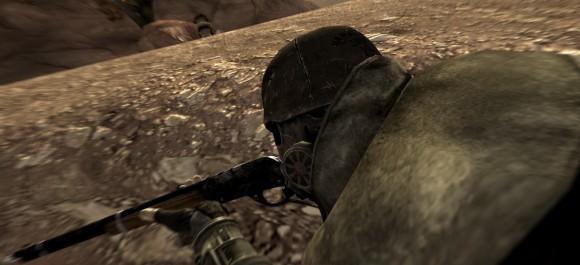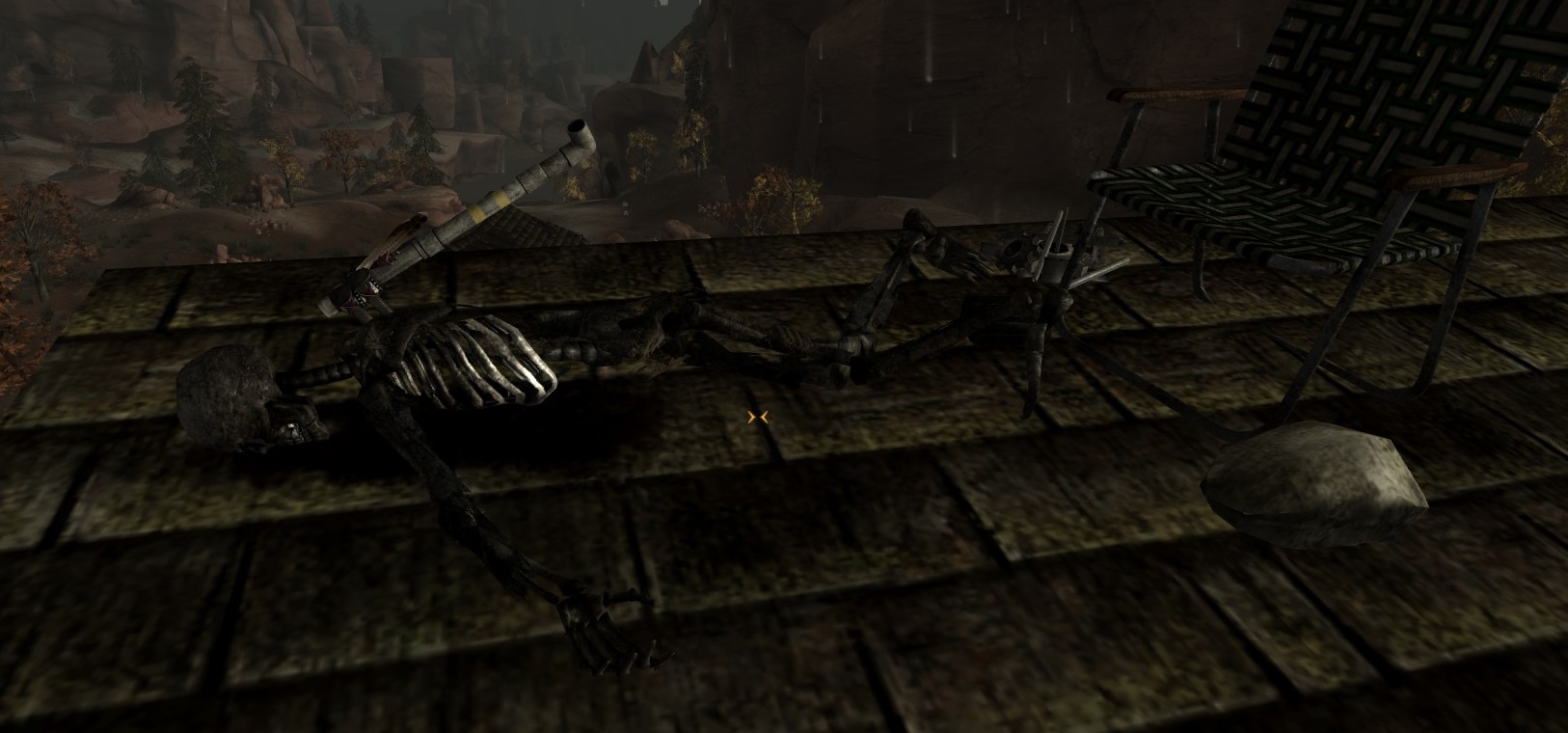
Honest Hearts, the second piece of DLC for Fallout: New Vegas, takes you to the valley of Zion – what was once Utah’s Zion National Park. It’s one of the few places of genuine beauty in post-apocalyptic America, somehow recovering from the worst of the fallout more rapidly than other regions of the wasteland. The DLC begins with you joining a caravan from the Happy Trails company and setting off into Zion to re-establish trade routes with the New Canaanites of Utah – Zion being the only place safe and direct enough to manage trade between the Mojave wasteland and Utah. What takes place afterwards sees you caught up in the destinies of three tribes: the White Legs, the Dead Horses, and the Sorrows.
This paragraph is an obligatory spoiler warning for people who want to play the DLC and have everything in it surprise them. I’m about to talk about events and characters from late in the story it tells.
The conclusion to Honest Hearts involves a disagreement between Joshua Graham – the Burned Man, a war leader driven by a desire for vengeance – and Daniel, a New Canaanite missionary and pacifistic leader.
Joshua Graham is the most obviously interesting character, having once been the champion of Caesar’s Legion (the seemingly unstoppable martial nation of slavers), punished for failing in the first assault on Hoover Dam. He’s a changed man, and the player has the opportunity to guide his destiny to varying conclusions, but ultimately his story is one of vengeance. Daniel, the Mormon missionary, is a far more interesting character.
Daniel is obsessed with a tribe known as the Sorrows, who are presented as a band of hunters with no skill in warfare. The Sorrows are themselves a peaceful people who have been raised to believe in legends of the Father in the Hills, a caring god who watches over them with compassion and kindness. In this Daniel sees his own Christian faith reflected.
What’s most interesting about this in the context of the game is the paternalistic way in which Daniel expresses his respect for the Sorrows. To some extent he is a man whose home and people have been destroyed and scattered, and to someone driven by faith this could represent a great challenge that might lead to them seizing onto anything that symbolises what they still desperately want to believe in. I believe that this is what the Sorrows represent to Daniel (and hell, it’s even right there in their name): the goodness of people before the fall. This is both the Christian Fall, before civilization’s light was extinguished in nuclear Armageddon, and before New Canaan was crushed by the White Legs.
But looked at another way Daniel is a white Christian missionary from a community known as the New Canaanites. Now, I’m unclear on how deliberate the choice of name was. There aren’t for me any obvious parallels with either the Biblical or historical Canaanites, but I’m not a Biblical scholar nor an expert on the ancient history of the Levantine people. So let’s skip past that and focus on the more modern role of Christian missionaries.
During the European colonial era both the Catholic and Protestant Churches – and their most evangelistic followers – were inextricably entwined with the activities of the major European powers around the world. There’s a rather fine quote – which I will ‘fess up to finding on wikipedia – which states that by the time the post-colonial era of the 1950s had come around, missionaries were viewed as “ideological shock troops for colonial invasion whose zealotry blinded them.”
A theme that quickly emerges from any serious historical exploration of imperial and colonial history is the paternalistic attitudes towards the colonised held among their imperial masters. The most well-known explication of this is the oft-derided doctrine of “the White Man’s Burdern” (named for a poem by Rudyard Kipling – a notable champion of British imperialism and an appalling racist to boot). Interpretations still differ but in the context of colonialism Kipling’s poem was a sort of “useful idiot” that helped colonisers justify their position, born of superiority of force, as superiority of culture and race. It put a homely humanitarian spin on the role of colonisers, arguing that they were there to help people who were too primitive to otherwise flourish, or too constrained by their inferior biology, and thereby disguising the barbarity with which they extracted wealth from the colonies and brutally suppressed both armed and non-violent dissidence among the natives (all ably explored in grisly and horrifying detail in John Newsinger’s The Blood Never Dried).
I mention all of this – and really I have only provided a very poor crash course in post-colonialism and imperial history – not because Daniel the New Canaanite extols any such theories or undertakes any such expropriation, or even because the dark side of colonial history is something that is explored in Honest Hearts, but because this is what his speeches about the “innocence” of the Sorrows remind me of. He, a white Christian, plans to protect their innocence by leading them from Zion Valley and to the Grand Staircase, a place where they will be free of the raiders who prey upon them. What a fatherlike, messianic authority figure he imagines himself to be, leading his chosen people to their future! (*)
In contrast, Joshua Graham wants to teach the Sorrows how to fight. Together with their allies the Dead Horse tribe they will smash the White Legs in Zion valley, kill their war chief, and drive the band of murderers and thieves from the territory they have invaded.
Given how explicitly Daniel’s words and attitudes evoke that history of colonialism(**), it was not difficult for me to decide to stand with Graham. I’ll teach these people how to fight, and how to protect their home from those who would take it from them – by any means.
I continue to love that New Vegas affords me these decisions; decisions underpinned by the richness and terribleness of human history.

(*) There is a lot of irony layered into the story here, given that Daniel is in fact leading the Sorrows from, not to, paradise – the Grand Staircase will afford them a desperate living whereas Zion is unpolluted, free of radiation and even has fish swimming about its rivers – and also that the god-figure of the Sorrows, the Father in the Hills, was unbeknownst to them a highly-trained survivalist who spent sixty years after the apocalypse slaughtering those who invaded the Valley and attacked its inhabitants. In the last year of his life he began to care for the migrants who came to Zion and would later become the Sorrows tribe.
(**) I’m pretty sure whoever designed Honest Hearts knew exactly what they were up to. There’s also a perk available called ‘Sneering Imperialist’. Oh yeah. Daniel’s not much better just because he believes he cares about the welfare of the Sorrows; he’s every bit as blinkered and arrogant.


Comments
8 responses to “New Vegas: Honest Hearts & post-apocalyptic post-colonialism”
I feel the setup leads much more into Martin Luther King vs. Malcolm X. Malcolm wanted black men to become militant and detach from white America. For them to take control of their lives, businesses, and future. Martin wanted blacks and whites to integrate peacefully, each having respect for the other. Also, I just feel like saying, Malcolm X gave the current state of black society as one of his worst-case scenarios.
Eventually, Martin Luther King won, but only because he had white support.
Also, if we're talking about imperialism, we should note that it actually worked in a few cases. Germany was a proud and caring imperialist father (for a decade). Spanish America interbred with indians, which allowed the race to survive (more). India was given unity in language and boundaries which probably supplants another middle eastern ever-warzone (not that it's much better). The American South used slavery as a way of taking care of the slaves, rather than oppressing them (their lives post-abolition were much, much worse. Plus, it only slowed their advance into legitimate society).
You have got to be trolling. Although I'm almost curious to hear what case could possibly be made that the Spanish conquest of the Americas contributed to the survival of the indigenous peoples it nearly exterminated.
I'm not trolling in the slightest. In Spanish America, the immigrants were willing to marry with locals. There's an entire culture partially based on the extinct indian culture. In the United States (and Canada probably), the immigrants refused to touch the indians. Besides being the most vulgar insult possible, we STILL haven't completely resolved the issue of indiant integration. Or, rather, our solution puts them in ghettoes.
I just like having all the facts on the table, is all. You'll notice that political attack ads will regularly say things like "voted for job-killing regulations" or "increased taxes," whilst completely ignoring what these laws actually did.
But, for the record, I'm an accomplished troll and an avid flamer.
"Also, if we're talking about imperialism, we should note that it actually worked in a few cases. Germany was a proud and caring imperialist father (for a decade). Spanish America interbred with indians, which allowed the race to survive (more). India was given unity in language and boundaries which probably supplants another middle eastern ever-warzone (not that it's much better). The American South used slavery as a way of taking care of the slaves, rather than oppressing them (their lives post-abolition were much, much worse. Plus, it only slowed their advance into legitimate society)."
Oh my god, dude. Just no. No no no no no.
Genocide, ethnic cleansing, manipulation of sectarian and tribal tensions, the brutal suppression of any and all resistance to colonial rule, the targeted assassination or murder of rebel figures, widespread rape of colonised peoples, loss of economic opportunities for the colonised, the export of wealth from colonised countries, European colonial myths about white biological and cultural superiority… none of this represents an aberration in colonial rule. It is inherent to what colonial rule is.
In every historical instance of one nation or people imposing themselves above another, people have been willing to fight and die in typically one-sided struggles to win their freedom. That is not a system that works. Imperialism has never, will never care for the colonised.
German history of imperialism I simply will not touch. Spain was one of the most barbarous imperial powers in the Americas and killed millions through disease and conquest, not to mention looting and plundering across the continent. Britain saw millions of Indians starve to death due to racist mis-management of imperial governance and brutally murdered entire villages during armed revolt within some provinces. As for the American South, the argument that slaves were better off under slavery is one of the most paternalist, decontextualised arguments possible: if the lives of many ex-slaves post-abolition were worse, it was because the United States (both in the North and the South) was not particularly interested in providing homes and jobs for these people. They were granted freedom into a country so riddled with racism that it saw the formation of the KKK the same year as the Civil War ended, that saw racist segregation continue for almost a century after emancipation, and that still suffers severe racial divisions to this day.
The history of imperialism and colonialism is one of the most shameful parts of European history and it is not an ancient legacy either. Though that is not to downplay other historical acts of imperial barbarism: instead it is to situate all such acts within a clear historical pattern.
It is also worth noting that towards the end of King's life he became increasingly radicalised, in many ways moving towards views earlier espoused by Malcolm X, in recognition that the efforts he had led had not succeeded in radically shifting racial dynamics in the United States. It is not improbable that King's growing repudiation of US capitalism as the basis of a social system able to coexist with the civil rights movement contributed towards the motivations for his assassination.
I don't disagree but on two points: that imperialism can never work, and the things you said about American slavery.
One of the critical problems with imperialism is that it's so intensely impersonal. When the ruler of a nation lives hundreds of miles away, when he has been taught that the nation is filled with inhuman humans, when he remembers that it's nor his nation, and he need not really care, and when he is cut off, even, from his own people, bad stuff happens.
Which is exactly what was different about American slavery. It was, maybe not intensely so, but very personal. Most slave-owners treated their workers as lesser humans and heretics. But, that's just the thing, they considered them human. They considered them less efficient and less virtuous, but still deserving of basic rights. In other words, slavery allowed incredible atrocities to occur by allowing one man to decide the fate of another. But most slave-owners were rational, Christian men who gave a certain amount of shit for his workers.
The thing is, the rampant racism, the lack of opportunity, and the KKK, all started the year the war ended. Not before. The South had been largely destroyed, in large part because the Northern strategy for war-winning was, quite literally, to destroy the South. Near the end of the war, the Emancipation Proclamation 'freed' slaves, many of which joined the Northern war effort. Now, if you need an easy excuse to explain why you lost war, and why half a generation of young men isn't here, you turn to the already disliked minority that fought against you.
If I had to make a metaphor, and this is a bit one-sided, I would use despotic (or aristocratic) monarchy. Now, monarchy is the single most effective form of government when you have capable leaders. Spain's 'glory' was anchored on a wizened king who lived in a hut. However, the vast bulk of the time, monarchy simply allows for leaders that are inept and disconnected from the populace.
Oh, and I could have mentioned the Rus. Ah, now I've missed the opportunity.
I know this is deviating from the point a bit, but this seems to me like progressiveness (or whatever you want to call it) at work. We like to arrange history in such a way that our more distant ancestors are barbarians and that our more recent ancestors are capable but flawed. Rather than reminding us that we are capable of history's greatest fuck-ups and tragedies (have done, will do, are doing), we use it as a way of explaining how much better we are. Why are cavemen always seen as gibbering idiots that only seek for food?
It's been bugging me a bit more than usual, and the Waiting For Godot line "The tears of the world are a constant quantity. For each one who begins to weep somewhere else another stops. The same is true of the laugh. Let us not then speak ill of our generation, it is not any unhappier than its predecessors. Let us not speak well of it either. Let us not speak of it at all. It is true the population has increased." embodies it. Is it really possible to make our lives or societies better? Or are we allowing our arbitrary goals and motivations give us a false sense of progress?
I think I'll be dropping this hot potato after this comment, mwm. I will just touch on a few points:
(1) The problems of imperialism are nothing to do with the distance between imperial rulers and those living under colonial rule. Proxy rulers and governmental systems are always put in place. The mistreatment of native people by colonial authoritities (governmental and civilian) is well-documented.
(2) On American slavery: I don't believe that "most slave-owners were rational, Christian men who gave a certain amount of shit for his workers." I have seen little if any evidence to support this beyond the wishful thinking of apologists for slavery. It is certainly not borne out by accounts written by slaves or ex-slaves.
I think the idea that racism in the United States originated after the Civil War is a deeply naive perception, both of the history of European and American slavery, of the history of white supremacism, and of the root sociological, economic and political factors that produce racism.
(3) This is a complete tangent from what we're actually talking about but I can't let it stand:
"Now, monarchy is the single most effective form of government when you have capable leaders." This simply is not true. Monarchic government in Europe routinely saw economies and populations mismanaged and countries dragged to war for the greed or arrogance of monarchs. That is not the result of "inept and disconnected" rulers. It is a fundamental trait of a system.
There is also a fundamental disconnect here: monarchic rule is incomparable to modern democratic nation-states. The entire basis of the entity is different. Under a historical monarchy it is assumed that a population, a country and everything in it exists for the sake of the monarch, who has a god-given right of rule. Under a modern democracy, the opposite is true: it is assumed that a government and that rulers are there for the people.
Sure, this is a grossly simplified summary (and entirely disregards the realities of realpolitik), but the point remains that the means and ends of these two entities are so different as to make them incomparable, except to add that any individual who felt any aspect of their quality of life would be better under the former is absolutely barking. As a person who lives under a system of governance, I'd rather live under one that purports to be for me, rather than a king who might rape my wife, possess my land, execute me on a whim or send me to die in a stupid war with one of his cousins on the mainland.
(4) I am certainly not attempting to rearrange history to make myself, a modern individual, feel better. What I am trying to do is make it clear that imperialism and colonialism can be clearly understood historically as inherently prejudicial in terms of social dynamics (and, given the instances we are discussing, white supremacism), and as barbarous in their use of violence to suppress resistance should the victims of colonialism take any action that undermines the myths that help prop up imperial colonies (such as, for example, the myth of the "good slave-owner").
In fact, I would go so far as to say that often modern myths around colonialism hide the more admirable parts of the historical reality. For example, the British public were widely appalled when they heard of what was done to people such as the Mau-Mau by colonial authorities – so both those colonial authorities, the British government and to a lesser extent the British media colluded to hide the truth.
This is not something you tend to learn about in the British educational system because it rather tends to dent national pride when you learn that national heroes like Churchill were perfectly capable of acting like monstrous sociopaths when it came to the colonised people upon whom British wealth and power depended. The same is true in any country.
If you would like to know more about the realities of life under British imperial rule and the white supremacism that propped it up then John Newsinger's _The Blood Never Dried_ is a fine book that draws on social historic techniques (i.e. the accounts of ordinary people rather than solely the chroniclers of the powerful). If you would like to know more about post-colonial theory and the depth to which Eurocentrism and white supremacism can penetrate psychology and culture, then Edward Said's _Orientalism_ is widely recognised as authoritative. Both of these will also be illuminating in terms of the lasting effects of racism and white supremacism through history and well into the modern age. Finally, I've not read it myself, but I have heard that Howard Zinn's _A People's History of the United States_ is a good general history, touching upon a lot of US history that many people would rather see forgotten. I'm not sure what to recommend as a good general history of imperialism – some one else might have a recommendation there.
Shaun's pretty much covered everything I would've said, but just quickly on Germany: during its brief colonial period Germany was responsible for at least one genocide (the deliberate near-extinction of the Herero and Naamaqua peoples in modern-day Namibia), not to mention laying the groundwork for another (colonial administration in Rwanda pioneered the social policy, later consolidated by the Belgians post-WWI, of creating an entrenched ethnic division between Hutu and Tutsi, the cumulative effect of which was to lead directly to the slaughter of 1994). They also found the time to launch one of the most vicious repressions of anti-colonial resistance (against the Hehe people in modern Tanzania), and were utterly uninterested in developing any of the 'benefits of civilisation', like schools, that other imperial powers eventually introduced